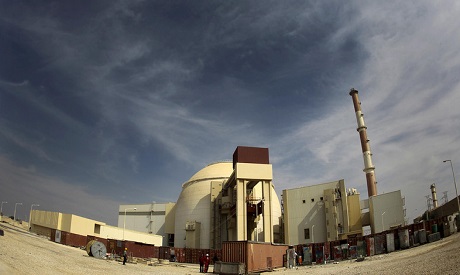
A general view of the Bushehr nuclear power plant, some 1,200 km (746 miles) south of Tehran 26 October, 2010 (Photo: Reuters)
Iranian negotiators halted nuclear talks with major powers to return for consultations in Tehran on Friday after Washington blacklisted a dozen companies and individuals for evading US sanctions, state media reported.
"The Iranian negotiators interrupted the talks with the P5+1 for consultations in Tehran," a negotiator told Iran's official IRNA news agency.
The negotiators had been discussing the implementation of a landmark interim accord agreed last month with the P5+1 -- Britain, China, France, Russia and the United States, plus Germany.
The decision to halt the talks in Vienna, which also involve the UN nuclear watchdog, came hours after Washington blacklisted a dozen overseas companies and individuals for evading crippling US sanctions on Iran's oil and baking sectors.
The move prompted two top senators to bow to White House pleas not to introduce new sanctions in Congress.
But it risked angering Tehran after repeated warnings from Iranian officials in recent days that any additional punitive measures would be a violation of last month's agreement.
Under the interim deal reached in Geneva, Iran agreed to freeze parts of its suspect nuclear programme for six months in return for some $7 billion in relief from Western sanctions as it negotiates a final, comprehensive accord to allay suspicions it is seeking a weapons capability.
The United States also agreed to refrain from slapping new sanctions on Iran, but senior administration officials argued that Thursday's measures were taken as part of the existing sanctions regime which had forced Tehran to the negotiating table.
Those blacklisted on Thursday included the Singapore-based Mid Oil Asia and Singa Tankers, both companies accused of helping Iran transfer badly-needed funds to a foreign bank on behalf of the National Iranian Tanker Company.
Ukrainian national Vitaly Sokolenko and his Odessa-based firm Ferland Company Limited were cited for helping to broker the sales of Iranian oil and transfer the crude ship to ship.
The US State Department also named five Iranian entities and several people that it alleges provide goods and services that contribute or risked contributing to Iran's nuclear programme or its development of ballistic missiles.
"Today's actions should be a stark reminder to businesses, banks and brokers everywhere that we will continue relentlessly to enforce our sanctions, even as we explore the possibility of a long-term, comprehensive resolution of our concerns with Iran's nuclear programme," said David Cohen, Treasury under secretary for terrorism and financial intelligence.
Administration officials insisted the timing of Thursday's blacklist move was entirely coincidental and not aimed at sending a message to Congress to back off new sanctions.
But just hours afterwards, Senate banking committee chairman Tim Johnson and the committee's top Republican Michael Crapo agreed with the White House that Washington should not introduce new sanctions, warning they could "rupture" international unity against Tehran's nuclear programme.
The comments virtually assured that no new sanctions legislation would pass Congress before the year-end break, although lawmakers could controversially introduce a new sanctions bill within the next week.
"Let me be clear. I support strong sanctions, and authored many of the US sanctions currently in place," said Johnson.
"But I agree that the administration's request for a diplomatic pause is reasonable," Johnson told a hearing by the panel.
"A new round of US sanctions now could rupture the unity of the international coalition against Iran's nuclear programme."
Before the Iranian delegation quit the talks late on their fourth day on Thursday, diplomats said they were proving to be a hard slog.
Participants said there were differences of opinion about sequencing Iran's promised nuclear freeze and the easing of sanctions agreed in last month's deal.
They insisted, however, that the discussions were not any harder than expected and that the differences would eventually be ironed out -- although not by the end of this week.
Short link: